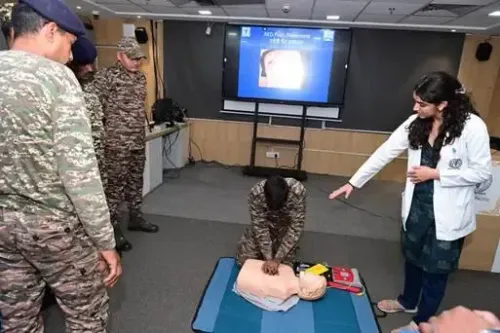Has the Gujarat Government Revamped Factory Work Laws for Women?

Synopsis
Key Takeaways
- Daily working hours increased from 9 to 12.
- Weekly cap on working hours remains at 48.
- Women can now work night shifts under strict conditions.
- Enhanced overtime compensation introduced.
- Safety measures for women include CCTV and secure transportation.
Gandhinagar, July 3 (NationPress) The Gujarat government has initiated a comprehensive overhaul of labour laws via an ordinance that permits factory workers to work up to 12 hours a day, an increase from the prior 9-hour limit, while maintaining the weekly cap at 48 working hours.
This initiative stems from the Factories (Gujarat Amendment) Ordinance, 2025, which was enacted on July 1 by the Labour, Skill Development, and Employment Department due to the absence of a state assembly session.
The ordinance aims to enhance industrial flexibility to attract investments, boost productivity, and generate employment in Gujarat’s manufacturing sector. According to the revised Section 54 of the Factories Act, daily work shifts can now extend to 12 hours, provided there is written consent from workers and compliance with weekly hour limits.
Moreover, the uninterrupted work duration can be increased from five to six hours, pending official notification. The ordinance also introduces enhanced overtime compensation: workers will receive double wages for extra hours, and the quarterly overtime ceiling has been raised from 75 to 125 hours, again necessitating voluntary participation from workers.
A significant aspect of this amendment is the provision allowing women to take on night shifts (between 7 PM and 6 AM), a move viewed as a push for gender inclusivity in the workplace.
However, this is contingent upon 16 strict safeguards, including round-the-clock CCTV surveillance, female security personnel, a minimum of 10 women per shift, and secure transportation. Importantly, no woman can be assigned to night duties without written consent, and provisions for protection against harassment are compulsory.
The Factories (Gujarat Amendment) Ordinance, 2025 brings about substantial changes to the state’s labour regulations, predominantly aimed at boosting industrial efficiency and employment flexibility.
Key provisions comprise increasing the permissible daily working hours from 9 to 12, while retaining the weekly limit of 48 hours, contingent upon the worker's written consent.
Additionally, it extends the maximum uninterrupted work period from five to six hours and raises the quarterly overtime limit from 75 to 125 hours, with requisite double-wage compensation.









